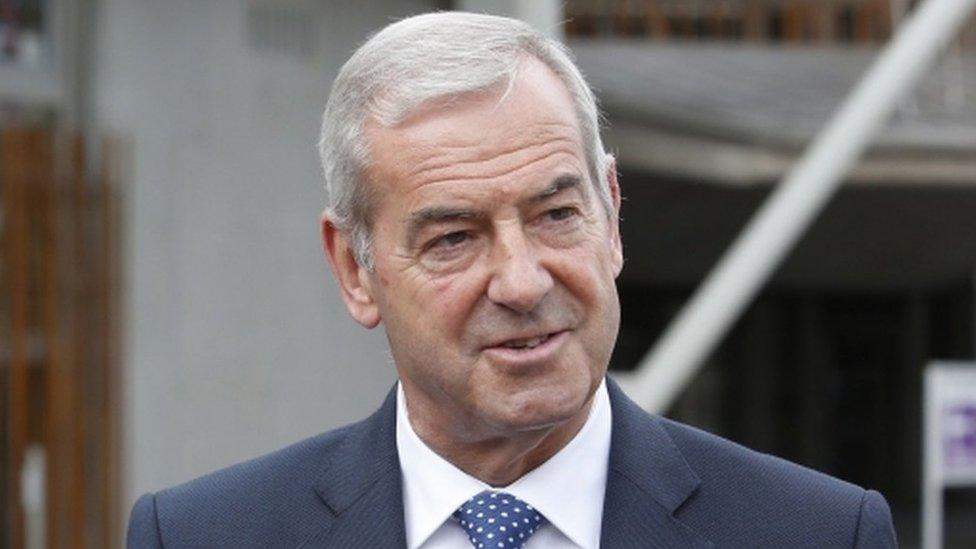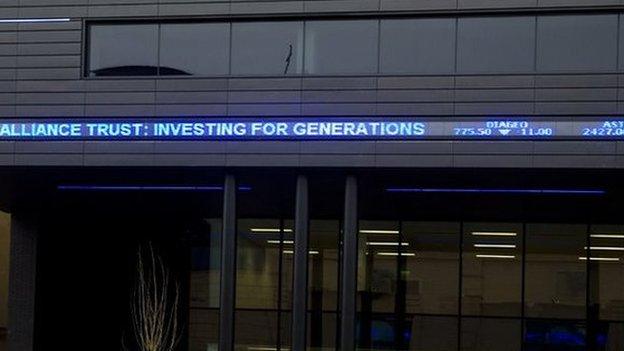Battle lines drawn for Scotland's corporate general
- Published

Lord Smith of Kelvin, or Robert to his chums, may be cut from the cloth of the canny Scottish accountant, but he's quite a risk-taker.
The Commonwealth Games in Glasgow were a highly complex challenge, and the 1986 Games in Edinburgh a reminder that things are not guaranteed to go well.
As chairman, Lord Smith showed his ruthless streak in ousting the first chief executive, at a time things were going off track.
Then there was the Smith Commission. The Prime Minister gave him the task of bringing five political parties round the table and hammering out a deal on new powers for the Scottish Parliament.
It was a far-reaching, multi-sided constitutional negotiation, under intense political pressures, and achieved in only a few weeks after the referendum.
On that role, you can also see the accountants' canniness - the chairman stepped well back once his report was delivered, probably knowing that some more difficult work started at that point.
His career has taken him from private equity dealmaking to the top of Deutsche Asset Management, then one of the largest fund managers in Britain. He has chaired SSE, and is newly chair of Forth Ports.
Bigger challenge
He was appointed by the UK Government, and re-appointed, as chairman of the Green Investment Bank, which he is currently preparing for privatisation.
He's chaired museum boards, advised the ministers on education and training, been Scottish governor of the BBC and sits in the House of Lords. He was chancellor of the University of the West of Scotland before a transfer up the Clyde to become chancellor of Strathclyde.
At the age of 71, you might think it's time for Smith to sit back, relax and chew the cud with his Highland cattle. That's particularly after having a heart attack last year, during dinner as a guest of the First Minister at her Bute House official residence.
But not so. He has agreed to another challenge - a small company, but a big pedigree, and facing a bigger challenge.
Alliance Trust has been under siege from activist investors for years. The Dundee fund manager gave ground to Elliot Advisers last year, and agreed to let two of the shareholder's nominees on to the board.
Within a year and a half of that, every face round the boardroom table will be new. Karin Forseke, a Swede and veteran of London finance, left the board in November without much ceremony.
Katherine Garrett-Cox, the highly-paid chief executive, was also ousted from the board and told she should get on with improving the Trust's performance. She takes her instructions from outside the room.

That involves a turnaround of her strategy for the Trust, aggressively going after a closing of the discount - the gap between the Trust's valuation and the value of the assets that make up its portfolio.
There's usually a gap, but activist investors have been complaining for years that it's too big at Alliance Trust, and that it is either inefficient or too costly to run.
It's certainly dwarfed by its neighbour to the north, Aberdeen Asset Management, where the boss, Martin Gilbert, has suggested he could take over the funds and run them better.
That is what now hangs in the balance. I'm told Elliot Advisers and its allies have given the board until July to prove that Alliance Trust can be turned around.
In addition to the boardroom changes, there is a radical shift in investment strategy, shedding several asset classes, including fixed income, and embarking on an extensive share buyback.
The retail savings end of the operation is also being organisationally split from the investing side, with separate boards - abandoning Garrett-Cox's patient approach to building up such new offshoots.
There's also little talk of the emphasis on ethical investments focussed on environmental and social outcomes, and good governance. The women who have run Alliance Trust for some years have been pushed aside for a more macho approach.
Long pedigree
If these changes don't get the desired results, Elliot wants the funds handed over to other, bigger fund managers.
The new chairman is understood to be agnostic on whether that happens, but given to some sentimental attachment to Alliance Trust's long pedigree.
This was the company built up by Dundee's merchants and jute barons from the merger of three trusts in 1888. It invested for them in colonial developments and in America's frontier.
It occupies a prominent place in the city centre, and in the Dundee identity. It has a large number of small investors, many of whom have inherited a commitment to the Trust going back generations.
Brewin Dolphin, the wealth manager, represents many of their stakes, and could be a key player in what happens next.
The long-standing investor base also includes DC Thompson, the Dundee publisher, which has been so canny in managing its affairs that it has also become a significant investor.
That could lead to an interesting showdown - between the aggressive, and sometimes ruthless tactics of hedge funds such as Elliott Advisers, and the couthy conservatism of the Family Thompson.
Lord Robert Smith is not one to shy away from a showdown.